News
 |
Available nowPost-Keynesian Economics Selected Essays on Pricing, Money and GrowthThis comprehensive collection brings together sixteen influential papers by Marc Lavoie that showcase the depth and breadth of post-Keynesian economic thought. Organized into four thematic sections, this volume offers critical insights into theoretical foundations, pricing mechanisms, monetary systems, and growth models that challenge mainstream economic paradigms. Beginning with foundational explorations of Post-Keynesianism and its relationship with Neo-Ricardianism, the collection traces the evolution of this heterodox school of thought and examines its development in different contexts, including its remarkable journey in Canada. The second section delves into the nuanced world of post-Keynesian pricing theory, examining mark-up pricing versus normal cost approaches and engaging with the influential work of Frederic Lee. The monetary section—the most extensive in the collection—addresses critical issues from endogenous credit-money theory to modern monetary theory (MMT), offering penetrating analyses of reserve systems, sovereign currencies, and inflation dynamics through a post-Keynesian lens. The final section revisits the author’s seminal contributions on growth and distribution models, exploring the reconciliation of Kaleckian and Sraffian approaches and examining innovative concepts like cadrisme and overhead labor costs. This essential volume not only preserves important theoretical contributions but also demonstrates the continuing relevance of post-Keynesian economics in addressing contemporary economic challenges. Scholars, students, and policymakers will find this collection an invaluable resource for understanding alternative approaches to economic theory and policy. The chapters in this volume were originally published in Review of Political Economy and are now presented with a new Introduction and Foreword. |
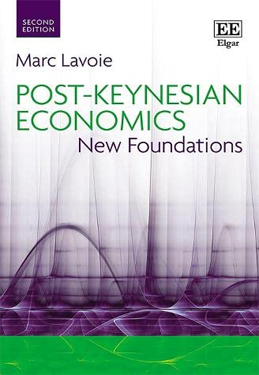 |
Available nowPost-keynesian Economics: New Foundations – Second EditionThe book is a considerably revised and updated version of the widely used and frequently cited 2014 edition, which won the EAEPE Myrdal Prize (now the Joan Robinson Prize). It provides an exhaustive account of post-Keynesian theory and policy. Topics covered include its methodological foundations, consumer theory and choice under fundamental uncertainty, firms and pricing, money and credit, effective demand and employment, growth theory, open-economy issues, inflation theory. It also links up with ecological economics. Scholars of economics, particularly post-Keynesian and heterodox economists, will find this comprehensive look at the field a necessary addition to their libraries and students and instructors will find it a perfect text for any class on post-Keynesian economics. |
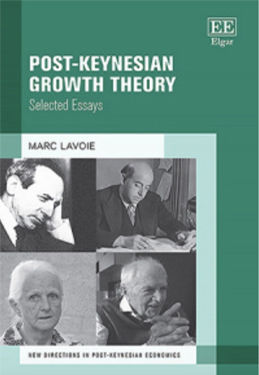 |
Available nowPost-Keynesian Growth Theory: Selected EssaysPost-Keynesian Growth Theory is the second volume of Marc Lavoie’s Selected Essays, and is a collection of 18 articles published between 1995 and 2020, on themes touching growth and distribution. The book contains an extended foreword by Eckhard Hein, and an introduction by Lavoie that recalls how he became attracted to post-Keynesian growth theory more than 45 years ago, and explains how and why this book came about. The collection includes a number of papers showing Lavoie’s evolving approach to neo-Kaleckian models of growth and distribution, incorporating hysteresis, overhead labour, monetary issues, price inflation, as well as various sources of autonomous non-capacity creating expenditures. It shows how all of these interact with alternative Marxian or Sraffian approaches as well. A section of the book is also devoted to two-sector models, in particular the issue of the traverse from one equilibrium to another, extending the Kaleckian model but also providing insights into the works of Hicks and Pasinetti. Both professors and graduate students will benefit from the decades of experience and wisdom amassed and presented in Post-Keynesian Growth Theory. |
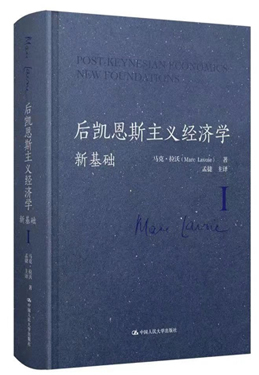 |
Available nowPost-Keynesian Economics: New Foundations – Chinese edition2021 Chinese translation of the book Post-Keynesian Economics (2014), organized by Jie Meng and Hui Yuan, in two volumes. The book is a considerably extended and fully revamped edition of the highly successful and frequently cited Foundations of Post-Keynesian Economic Analysis. It provides an exhaustive account of post-Keynesian economics and of the developments that have occurred in post-Keynesian theory and in the world economy over the last twenty years. Topics covered include open-economy issues, the methodological foundations of heterodox economics, consumer theory, firms and pricing, money and credit, effective demand and employment, inflation theory, and growth theories. |
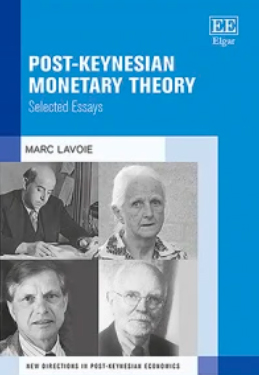 |
Available nowPost-Keynesian Monetary Theory: Selected Essays.
|
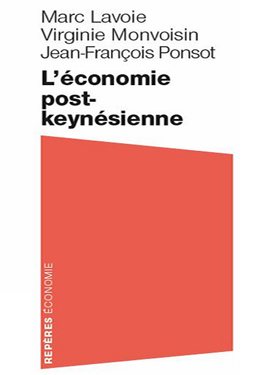 |
DisponibleL’économie post-keynésienneL’économie post-keynésienne fournit une grille d’analyse économique alternative. Plus qu’un simple prolongement de la pensée de John Maynard Keynes, elle contribue au renouvellement actuel de la pensée économique et des politiques économiques. Cet ouvrage vise à présenter de manière claire et synthétique les fondements, développements et résultats post-keynésiens. Après la présentation de l’hétérodoxie post-keynésienne, il souligne l’importance des mécanismes monétaires, leurs liens avec la dynamique macroéconomique, puis traite de l’analyse de court terme (microéconomie, demande effective et marché du travail) et de celle de long terme (croissance). Il s’adresse aux étudiants désireux de découvrir l’économie post-keynésienne et ses modèles récents, comme la théorie monétaire moderne. Au-delà, il intéressera toute personne à la recherche d’éléments d’analyse permettant de mieux comprendre les défis majeurs de notre époque. |